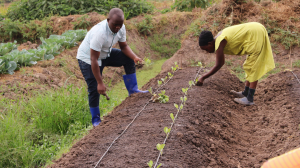
Seed sector’s role in tackling climate change in the spotlight at COP29 Agriculture Day
ISF participated in side events to highlight the role of high-quality seeds and the seed industry in creating more sustainable food systems and share results from the Seed Resilience project.
“The impacts of climate change – from temperature rises to water scarcity, soil degradation and salinization – are punishing agriculture around the world. The global seed sector provides climate-resilient solutions and innovations that safeguard food security and nutrition today and in the future,” said Michael Keller, Secretary General of ISF.
Seeds for a Resilient Future
A newly published ISF report, “Seeds for a Resilient Future,” emphasizes the urgency of investing in plant breeding technologies and adopting policies backed by science and consistent with international standards to accelerate the development and accessibility of climate-resilient crop varieties, especially in vulnerable countries.
The report underscores the 2024 seed sector survey finding that over half of seed sector stakeholders view climate change as their foremost challenge, underscoring the need for immediate action.
“High-quality seeds and modern plant breeding are the building blocks for sustainable agriculture,” said Ben Rivoire, ISF Sustainability and Crop Value Chain Manager. “At COP29, we are urging governments, public institutions, businesses, and civil society to unite in supporting innovations, policies and collaborations that empower farmers and communities through climate-resilient seed to mitigate agriculture’s carbon emissions and adapt to increasingly unpredictable and extreme weather.”
Showcasing Impact: The Seed Resilience Project in Rwanda
The ISF Seed Resilience Project, which is being implemented in Rwanda in partnership with Fair Planet and the Rwanda Agriculture and Animal Resources Development Board (RAB), serves as an example of how access to high-quality, locally adapted seed, along with training on Good Agricultural Practices, can dramatically improve farmers’ yields for vegetable crops, improving their incomes and food and nutrition security in the long run.
As of August 2024, 61 crop varieties of carrot, cabbage, tomato, sweet pepper, and onion were tested, with 22 found suitable for market adoption based on superior yields and quality. Production protocols were developed for all tested crops.
“With notable successes such as a nine-fold increase in carrot yields, the project demonstrates the potential of improved seeds to enhance both food security and nutrition. By addressing key dietary pillars—vegetables for vitamins, pulses for proteins, and cereals for carbohydrates—the project lays the groundwork for sustainable agricultural growth in vulnerable regions,” said Keller.
Validation trials are ongoing and will be shared later in the year. New potato variety trials also is ongoing, with eight varieties on a 2,300 m² plot planted in April 2024. Plans are underway to expand trials to on-farm testing with 100 farmers in collaboration with RAB and the Rwandan Ministry of Agriculture (MINAGRI) in upcoming seasons.
Dr Alon Haberfeld, Operations and Technology Manager of Fair Planet, shared: “In a rapidly changing environment, it is crucial to develop crop varieties tailored to the specific needs of smallholder farmers. The Seed Resilience Project in Rwanda identifies and promotes the most suitable varieties for each production region, empowering smallholder farmers to achieve high yields even under shifting climate conditions. This approach strengthens food systems, enhances resilience, and contributes to improved food security."
A Call to Action
To build on these successes, ISF presented a threefold call to action:
Adopt Science-Based Policies: Governments must uphold regulations grounded in scientific evidence, enabling the movement of high-quality seed across borders while fostering innovation in seed.
Foster Public-Private Collaboration: Partnerships must leverage complementary strengths to strengthen seed systems in climate-vulnerable countries and improve farmers’ access to high-quality seeds.
Commit to a Resilient Future: Climate-resilient seed is the starting of resilient food systems. The seed sector, working with other actors in the broader agri-food systems, national governments, and public institutions, can build more sustainable agrifood systems that endure the challenges of climate change and feed generations to come.
“ISF’s participation at COP29 and future climate COPs underscores our century-long commitment to ensuring quality seed is accessible to all, supporting sustainable agriculture and food security,” said Keller, “and this commitment continues in the face of all the challenges presented by climate change.”
Donna Bowater
Marchmont Communications
donna@marchmontcomms.com
Distribution channels: Agriculture, Farming & Forestry Industry, Environment, Food & Beverage Industry, International Organizations, World & Regional
Legal Disclaimer:
EIN Presswire provides this news content "as is" without warranty of any kind. We do not accept any responsibility or liability for the accuracy, content, images, videos, licenses, completeness, legality, or reliability of the information contained in this article. If you have any complaints or copyright issues related to this article, kindly contact the author above.
Submit your press release
